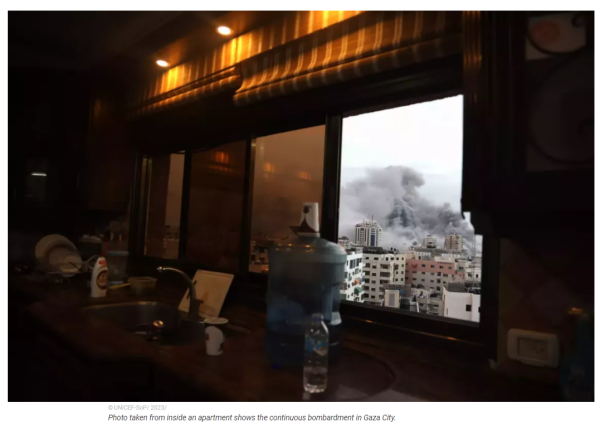Rasha, pregnant and with her 3 children, has been forced to move south of the Gaza Strip seeking a safe place for her family.
In the context of the war-torn Gaza Strip, Rasha, a 26-year-old mother of three children and eight months pregnant, is facing the added challenge of her diagnosed condition, thalassemia, a blood disorder that affects how her body produces hemoglobin.
Rasha and her family lived in the north of the Gaza Strip, where since the beginning of the war they suffered continuous bombardments, in addition to the shortage of food and supplies, eating once a day and relying on canned lentils and beans. Getting the minimum for her young children was also a daily challenge, they struggled to find the essentials, trying to survive on what little they had, “With just one container of formula remaining, I resorted to adding a single spoon to the entire bottle for my youngest child, allowing my kid to catch the smell of the milk before drinking it”, she explained. Diapers were rationed also, limiting their use to nighttime and keeping a vigilant eye during the day. This situation has even affected their health, causing diarrhea and weight loss.

UNICEF-SoP/ 2023/Photo taken from inside an apartment shows the continuous bombardment in Gaza City.
The family had already been forced to flee before, compelled to leave Gaza City due to the bombardments. The children, aged 7, 5, and 3, lived in constant fear and anxiety, their dreams are shattered by the sound of the airstrikes and the tanks. The family took the difficult decision to seek refuge in the south of the Gaza Strip, leaving behind their home and their memories.
As they prepared to embark on this uncertain journey, Rasha and her husband confronted their children’s concerns: “What about our clothes and toys? Why are we leaving? Where are we going to go?” They promised them new clothes and toys after the war, looking forward to making those promises a reality while trying to calm them down “We simply explained we were looking for a safe place to keep them safe”, she said.
The journey to the south was a harrowing descent into hell as Rasha describes: “We walked amidst the unimaginable, not allowed to stop, unable to help the injured people we met on our way.”
“I carried only my handbag, containing our passports, bread, and a bottle of water for the children”, that was the only thing Rasha could carry on. Rasha and her family started their journey at 11 am towards her parents’ home in Khan Younis. The streets were crowded, tanks and soldiers flooded the road, terrifying those who left their lives behind looking for safety. “My children were terrified, walking with their heads down, weeping, and surrounded by death”, she emphasized.

UNICEF-SoP/ 2023/Displaced people from the northern Gaza Strip are heading south due to the intensity of the fighting in the northern Gaza Strip.
For Rasha, pregnant and having thalassemia, every step required a huge effort. She had run out of the iron tablets that she needed, and she was extremely tired and worried when she didn’t feel her baby’s movements, “The constant pain and weight loss add to the worry. With no doctors to consult, it’s a challenging situation.”, she worriedly points out.
Arriving at her family’s house in Khan Younis was a moment of bittersweet relief. At that time, she knew that if she couldn’t reach the hospital in case of childbirth, her family would help her through the process. “It’s not an ideal situation, but with no access to medical care, it’s a potential option. A harsh reality when there’s no access to medical care”, she outlines.
Her 7-year-old daughter Mimi describes the journey from north to south as a scary experience. “It was scary. I saw houses all broken and dead people on the streets. Tanks were the scariest. They look really scary.”, she said. When she is not hiding from the sound of the bombardments, she likes to draw. “I want to draw happy things like before, but nothing is happy anymore”, she said while she explains that now her drawings are based on what she sees: tanks, planes, and dead people.
Mimi wishes the war would end and they could get their lives back, “I used to draw flowers, sunshine, and my family. I wish we could go back to our home and stay safe and alive with my family.”
Like Rasha and her family, over 1,7 million people in the Gaza Strip have had to leave their homes behind to seek refuge in the south of the Strip. UNICEF together with its partners: the Governments of Australia, Germany and Norway, the French Development Agency (AFD), the EU Humanitarian Aid, the UN Emergency Fund (CERF), and other UNICEF Regular Resources, continue to support displaced families in the Gaza Strip, providing lifesaving supply services, nutritional supplies, water, medical supplies, and other services to cover the basic needs. But this is far from enough. The needs are immediate and immense, and they will not be covered until a permanent humanitarian ceasefire is established to protect civilians and humanitarian workers, and to ensure safe and sustained access to aid.
Document Sources: United Nations Childrens Fund (UNICEF)
Subject: Armed conflict, Casualties, Ceasefire, Children, Food, Gaza Strip, Refugees and displaced persons, Women
Publication Date: 14/02/2024
URL source: https://www.unicef.org/mena/stories/journey-through-hell-familys-story-resilience-war-torn-gaza-strip

